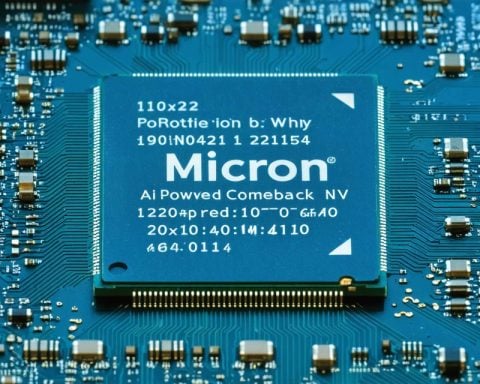The rapid expansion of artificial intelligence (AI) is fueling substantial growth in the chip industry, putting key companies in the spotlight. This surge presents a golden opportunity for investors eager to tap into a future-driven market. According to Statista, the AI chip market will experience a significant growth of over 30% in 2024, far outpacing the broader semiconductor sector’s 16% growth.
Nvidia’s Relentless Ascent
Nvidia’s (NVDA) journey in 2023 has been nothing short of remarkable, with its share price skyrocketing by 186%. Despite this meteoric rise, Nvidia continues to be a promising option for those who haven’t yet invested. The company is experiencing robust demand, as highlighted in its recent earnings report, which showed a revenue increase of 94% year-over-year to $35 billion. Nvidia’s CEO emphasized the crucial role the company plays in the current AI revolution.
The upcoming Blackwell computing platform, expected to launch next year, promises to further accelerate Nvidia’s growth. This customizable platform is designed to enhance computing power for generative AI tasks. Nvidia’s stock, trading at a reasonable valuation given its projected 37% annualized earnings growth, suggests it can still offer high returns.
Taiwan Semiconductor Manufacturing’s Stronghold
Taiwan Semiconductor Manufacturing (TSM) has also been reaping the benefits of AI-driven demand, with its shares up by 91% over the past year. TSMC’s Q3 revenue surged 36% year-over-year, bolstered by strong AI-related demand that exceeded expectations. The company plans substantial capital investments to meet this growing demand, with anticipated capital expenditures surpassing $30 billion for the full year.
With TSMC’s dominant 62% market share in global foundry services and anticipated earnings growth of 31%, it remains a strong contender for those looking to capitalize on the evolving AI landscape.
The AI Chip Revolution: Unveiling Hidden Impacts and Opportunities
The rapid development of artificial intelligence (AI) is shaking up industries worldwide, with unexpected impacts reaching beyond the spotlight-stealing giants like Nvidia and Taiwan Semiconductor Manufacturing (TSM). As the AI chip market sees explosive growth, understanding its broader implications reveals a complex tapestry of advantages and challenges faced by people, communities, and countries around the globe.
Interesting Facts and Lesser-Known Impacts
The AI chip market isn’t just driving up valuations for companies like Nvidia and TSMC. It’s also unveiling new opportunities and challenges for smaller tech firms and startups. These companies are now stepping into the spotlight, contributing to the diversification of the semiconductor industry by specializing in niche AI applications. This transformation opens the door for increased innovation, leading to specialized chips that could revolutionize sectors such as healthcare, automotive, and finance.
Communities within tech hubs, particularly in regions with burgeoning semiconductor industries, are experiencing job growth and increased economic opportunities. However, this surge is also leading to competitive pressure, with a demand for highly skilled workers often outstripping local educational systems’ ability to provide adequate training. This gap presents an opportunity for educational institutions to innovate and adapt, providing new curricula focused on AI and semiconductor technologies.
Advantages of the AI Chip Boom
1. Economic Growth: The boost in chip production stimulates local economies and creates high-tech jobs, fostering environments ripe for tech innovation.
2. Technological Advancement: With more investment comes rapid development of new technologies, enabling breakthroughs in sectors such as healthcare, where AI chips facilitate real-time data analysis for diagnostics.
3. Global Leadership: Countries leading in AI chip production position themselves at the forefront of technological advancement, enhancing global influence.
Disadvantages and Controversies
1. Supply Chain Vulnerabilities: The concentration of chip manufacturing in certain regions, such as Taiwan, exposes the global economy to geopolitical tensions and natural disasters, highlighting the need for a diversified supply chain.
2. Environmental Concerns: The semiconductor manufacturing process is resource-intensive, raising concerns about sustainability and prompting debates around the environmental impact.
3. Ethical Implications: The proliferation of AI technologies powered by advanced chips raises ethical questions, particularly concerning privacy, security, and the potential misuse of AI in surveillance.
Controversial Questions
– How can we ensure a balanced distribution of benefits from AI chip advancements across different sectors and socio-economic groups?
Answer: Ensuring equitable access to technological advancements requires policymakers to work closely with industry leaders to create initiatives that promote inclusivity, such as subsidies for underfunded sectors and increased support for educational programs in AI technology.
– What strategies are in place to mitigate the environmental impact of semiconductor manufacturing?
Answer: Companies are investing in green technologies and sustainable manufacturing practices, though there remains a need for stricter regulations and incentives to encourage widespread adoption of eco-friendly practices.
For readers interested in a deeper dive into the world of AI and semiconductor technologies, visiting comprehensive resources such as Statista offers valuable industry insights and data.
The AI chip revolution is a double-edged sword, presenting thrilling opportunities and daunting challenges. As it shapes the future, balancing innovation with ethical considerations will be crucial in fostering a world where technological progress benefits all.























